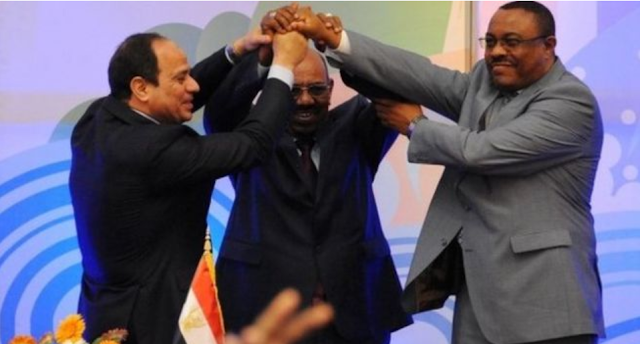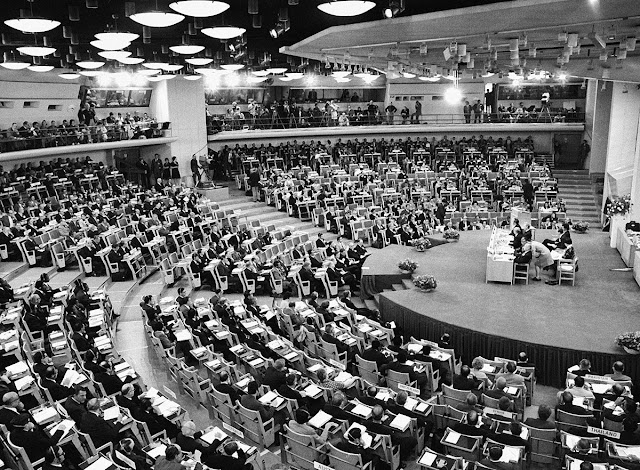The Grand Ethiopian Renaissance Dam: Democratizing the Nile River
The Nile River is a lifeline to close to
three hundred million inhabitants from which half of them lives under the poverty
line. Underdevelopment hinders the Nile River from playing a leading role in
poverty eradication attempts across the Basin. Riparian states seem resolute to deliver on the Sustainable Development Goals by democratizing
the Nile River, and it seems inevitable.
Colonizing the Nile
Ensuring the continuous flow of the Nile River has been the guiding national security objective of successive
administrations in Egypt, be it the Ottoman, the British, or successive
Egyptian presidents, often at all but ill-advised costs. Whoever ruled Egypt
followed a legal, political, or diplomatic endeavours to pursue the national
security objective. Waters of the Nile should reach the land of the pharaohs
disregarding the needs of millions of people living in the entire river basin.
Countries beyond the Lake Nasser, most of them under the British colonial rule,
were forced to enter into international agreements or arrangements forgoing
their right to utilize the Nile River. ‘Legalized’ monopoly over the use of
River Nile.
However, the British deal with Ethiopia was different. Ethiopia,
registering a significant victory over the Italian colonial army, had an
advantage slightly over the British. King Menilik agreed only not to ‘arrest’
the flow of the River Nile. British were concerned that Ethiopia will use its
‘Nile Diversion Card’ in its relations with them. British concern was
legitimate considering Ethiopia’s track record. Ethiopia used to threaten to
diverge the course of the Nile River to pressure the Ottoman rulers in Egypt to
ease religious oppression on Christian minorities in Egypt. Could Ethiopian
emperors be able to divert the Nile from flowing downstream to Sudan and Egypt?
Ethiopia had neither the motive nor the capability to divert the flow of the
mighty Nile River.
Neo-Colonizing the Nile
After the British left Egypt, successive
Egyptian presidents pursued a mixture of tactics to capitalize on the gains of
the British. In this quest, Egypt attempted to annex Sudan and Eritrea, entered
into an exclusionary treaty with Sudan, and built a vast reservoir. Egypt
signed a bilateral agreement with Sudan and completed the Aswan High Dam. As H.
Erlich famously captured Egypt’s triumph, “Ethiopia’s
threat to interfere with the Nile- from twelfth-century Lalibella, fifteenth-century
Zar’ a Ya’qob, to Aklilu Habte-Weld 1949, Haile Selassie 1950, and Mengistu
1980 lost its sitting as Aswan High Dam was born.” Ethiopia was no master
of the Nile River more. However, the highness of Aswan Dam or the greatness of
Lake Nasser could not change the mere fact that the Nile River stretches beyond
Egyptian geographic boundary or the mighty Nile River also belongs to the
people of the Nile basin beyond the Aswan High Dam.
 |
| Aswan High Dam |
Thus, the 1959 Egypt – Sudan bilateral
treaty over the utilization of the Nile waters and the Aswan High Dam was an
attempt to consolidate ‘colonial right’ over the utilization of the Nile River.
From that point onwards Egyptian national security revolves around maintenance
of ‘colonial rights’ which they proudly call ‘historic.’ For half a century,
Egypt successfully monopolized the utilization of the Nile River because the priority
of most post-colonial Nile Basin countries was to consolidate the gains of political
independence. However, it did not take much time for these states to realize
that true independence can be realized and only sustained by addressing the historical
underdevelopment through the utilization of natural resources, the Nile River
as one.
Decolonizing the Nile
After a decade-old negotiation, Nile Basin
Countries put an end to the colonial arrangement over the Nile River as they
signed the Cooperative Framework Agreement on the utilization of the River
Nile. The democratization of the utilization of the river has started. The
World Bank was instrumental in the attainment of this historic agreement over
the Nile River. The treaty obligates the Nile riparian countries to cooperate on
the conservation, management, and sustainable development of the Basin and its
waters – virtues of democratized Nile Basin. However, Egypt’s ‘neo-colonial’ administration
could not accept the democratization of the Nile River because the treaty and
the Nile basin states rejected ‘colonial rights’ and upheld equitable
utilization.
Egypt was convinced that the new agreement on the Nile is a paper
tiger because the actual utilization of the water resource requires a considerable
investment, something the impoverished Nile basin states lack altogether. The ‘colonial
rights’ continued to overshadow the utilization of the Nile waters until
Ethiopia announced that it is constructing ‘Project X,’ later renamed the Grand
Ethiopian Renaissance Dam, in 2011. Ethiopia broke through the glass ceiling! Egypt’s
colonial insurance policy from twenty-century veiled protectorate of British, to Nasser 1960s, Sadat 1970s,
Mubarak 1990s, and el-Sisi 2010s lost its sitting as the Grand Ethiopian
Renaissance Dam was born – poetic justice to Erlich’s earlier words.
Democratizing the Nile
In history, Ethiopia’s decision to
construct the Renaissance Dam will be remembered as the end of colonization and
the beginning of the democratization of the Nile River. Egypt has neither a
legal ground nor political leverage to stop the construction of the dam.
Therefore, it resorted to the round table discussion. After years of negotiation,
Ethiopia, Sudan, and Egypt signed a landmark agreement on Declaration of Principles
on the Grand Ethiopian Renaissance Dam.
 |
| Signing Ceremony of the DOP, March 23, 2015, Sudan (Khartoum) |
The agreement rejected the age-old
Egyptian ‘colonial right’ of utilization over the Nile and replaced it with equitable
and reasonable utilization. Do not be surprised; the Egyptian president
committed his country on a treaty whose bedrock principle is equity. It took
the Grand Ethiopian Renaissance Dam for Egypt to embrace equity over colonial
rights. The Grand Ethiopian Renaissance Dam became the second most
democratizing force next to the Cooperative Framework Agreement in the Nile
Basin.
The Failed Revisionism
On 23rd of March 2015, Egypt,
Ethiopia and Sudan signed the Declaration on Principles, and the treaty
launched the democratization wave of the Nile. The world was also hopeful that
the principles of cooperation and equity as stipulated in the Declaration would
soon transcend into the entire Basin. In other words, if Egypt accepted the
principle of equitable utilization vis-à-vis Ethiopia, it is either automatic
or natural for Egypt to allow the same principle to govern its water relations
with the rest of the riparian countries. It proved to be wishful thinking!
 |
| President el-Sisi and President Trump in White House |
Egypt wishes to swim against the wave of
democratization – Egypt reverted to the colonial era. Egypt manipulated all the
political, diplomatic, economic, security, and financial leverages to pressure
Ethiopia to accept Egyptian ‘colonial rights’ over the Nile River to no avail.
It is discouraging to witness Egypt’s recent revisionist attempt to curb the
democratization of the Nile. Egypt relapsed! Why?
Facing the Music of Democratization of the Nile River
Egypt is more concerned about the precedence
than the economic value of the Grand Ethiopian Renaissance Dam. The wave of
democratization, once resonate around the Basin, will empower all the riparian countries
to sustainably develop the Basin and its waters – a nightmare for the neo-colonial
Egypt.
Absent an agreement to the contrary; riparian
states will pursue the development of their watercourse. Bilateral negotiation
with all the riparian countries will make matters worse for Egypt. As a result,
Egypt will embrace Boutros-Ghali’s assertion that basin-wide cooperation
is the only viable alternative for Egypt to guarantee a sustainable flow of the
Nile. Egypt will sign the Cooperative Framework Agreement. Egypt will complete
the democratization of the Nile basin!
It only takes pragmatic reconciliation of
reality in the Nile Basin for Egypt to embrace the democratization of the Nile
River. Democratization is a wave – it is inexorable!






Comments
Post a Comment